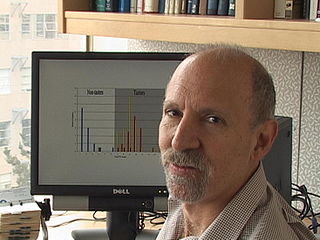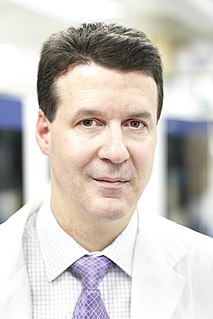Related Research Articles

Carnegie Mellon University (CMU) is a private research university based in Pittsburgh, Pennsylvania. Founded in 1900 by Andrew Carnegie as the Carnegie Technical Schools, the university became the Carnegie Institute of Technology in 1912 and began granting four-year degrees. In 1967, the Carnegie Institute of Technology merged with the Mellon Institute of Industrial Research, formerly a part of the University of Pittsburgh, to form Carnegie Mellon University. With its main campus located 3 miles (5 km) from Downtown Pittsburgh, Carnegie Mellon has grown into an international university with over a dozen degree-granting locations in six continents, including degree-granting campuses in Qatar and Silicon Valley, and more than 20 research partnerships.

The Mellon College of Science (MCS) is part of Carnegie Mellon University in Pittsburgh, Pennsylvania, US. The college is named for the Mellon family, founders of the Mellon Institute of Industrial Research, a predecessor of Carnegie Mellon University.

Professor Sir Simon Baron-Cohen is a British clinical psychologist and professor of developmental psychopathology at the University of Cambridge. He is the Director of the University's Autism Research Centre and a Fellow of Trinity College. In 1985, Baron-Cohen formulated the mind-blindness theory of autism, the evidence for which he collated and published in 1995. In 1997, he formulated the fetal sex steroid theory of autism, the key test of which was published in 2015.
Genetic genealogy is the use of genealogical DNA tests, i.e., DNA profiling and DNA testing in combination with traditional genealogical methods, to infer biological relationships between individuals. Genetic genealogy involves the use of genealogical DNA testing to determine the level and type of the genetic relationship between individuals. This application of genetics came to be used by family historians in the 21st century, as tests became affordable. The tests have been promoted by amateur groups, such as surname study groups or regional genealogical groups, as well as research projects such as the Genographic Project.

Many causes of autism have been proposed, but understanding of the theory of causation of autism and the other autism spectrum disorders (ASD) is incomplete. Research indicates that genetic factors predominate. The heritability of autism, however, is complex, and it is typically unclear which genes are involved. In rare cases, autism is associated with agents that cause birth defects. Many other causes have been proposed, such as childhood immunizations, but numerous epidemiological studies have shown no scientific evidence supporting any link between vaccinations and autism.

Neil Risch is an American human geneticist and professor at the University of California, San Francisco (UCSF). Risch is the Lamond Family Foundation Distinguished Professor in Human Genetics and Director of the Institute for Human Genetics and Professor of Epidemiology and Biostatistics at UCSF.

Randolph Frederick Pausch was an American educator, a professor of computer science, human–computer interaction, and design at Carnegie Mellon University (CMU) in Pittsburgh, Pennsylvania.
Linda M. Brzustowicz is a professor of genetics at Rutgers University and a member of the Motif BioSciences Scientific Advisory Board, whose main purpose is to develop technology that will benefit all laboratories using "biosamples," or samples of blood, DNA, stem cells, etc. that advance the field of human genetics. She has produced notable research in human gene functions in both the pathologic and normal states, contributing to the understanding of genetics of schizophrenia, autism, and specific language impairment (SLI). Because the diagnosed cases of childhood autism have experienced an unprecedented spike in recent times, causing speculation about the debatable "autism epidemic," such research is invaluable.

Jay Tischfield is MacMillan Distinguished Professor and the Founding Chair of the Department of Genetics at Rutgers University. He is also Professor of Pediatrics and Psychiatry at Rutgers. He is currently Director of the Human Genetics Institute of New Jersey.

Dr. Dietrich A. Stephan, Ph.D. is an American human geneticist and entrepreneur who works in personalized medicine. Stephan is currently CEO of NeuBase Therapeutics and a General Partner in Cyto Ventures. Before NeuBase, Stephan was CEO of LifeX and Chairman and Professor of Human Genetics at the University of Pittsburgh. Prior, he was founding Chairman of the Neurogenomics Division at the Translational Genomics Research Institute. Stephan has founded or co-founded 14 biotechnology companies and advised many others. Stephan was co-founder of Navigenics, a personal genetics company.

Stephen Wayne "Steve" Scherer is a Canadian scientist who studies genetic variation in human disease. He obtained his PhD at the University of Toronto under Professor Lap-chee Tsui. Together they founded Canada's first human genome centre, the Centre for Applied Genomics (TCAG) at the Hospital for Sick Children. He continues to serve as director of TCAG, and is also director of the McLaughlin Centre at the University of Toronto Faculty of Medicine.
Ronald Wayne "Ron" Davis is Professor of Biochemistry & Genetics, and Director of the Stanford Genome Technology Center at Stanford University. Davis is a researcher in biotechnology and molecular genetics, particularly active in human and yeast genomics and the development of new technologies in genomics, with over 30 biotechnology patents. In 2013, it was said of Davis that "A substantial number of the major genetic advances of the past 20 years can be traced back to Davis in some way."

David J. Dausey is an American epidemiologist, professor and academic administrator. He is the Provost of Duquesne University in Pittsburgh, Pennsylvania. He was formerly the Provost of Mercyhurst University in Erie, Pennsylvania. Prior to Mercyhurst, Dausey was a professor at Carnegie Mellon University in Pittsburgh, Pennsylvania, where he maintains an honorary faculty appointment as a Distinguished Service Professor. Dausey was also Policy Researcher at the RAND Corporation.

Francesca Gabrielle Elizabeth Happé is Professor of Cognitive Neuroscience and Director of the MRC Social, Genetic and Developmental Psychiatry Centre at the Institute of Psychiatry, Psychology and Neuroscience, King's College London. Her research concerns autism spectrum conditions, specifically the understanding social cognitive processes in these conditions.
Joseph D. Buxbaum is an American molecular and cellular neuroscientist, autism researcher, and the Director of the Seaver Autism Center at the Icahn School of Medicine at Mount Sinai. Buxbaum is also, along with Simon Baron-Cohen, the co-editor of the BioMed Central journal Molecular Autism, and is a member of the scientific advisory board of the Autism Science Foundation. Buxbaum is a Professor of Psychiatry, Neuroscience, and Genetics and Genomic Sciences. He is also the Vice Chair for Research and for Mentoring in the Department of Psychiatry at the Icahn School of Medicine at Mount Sinai.
Arthur L. Beaudet is a professor and chair of molecular and human genetics at Baylor College of Medicine. He was inducted into the Institute of Medicine in 1995, the Society of Scholars in 2008 and into the National Academy of Sciences in 2011.
Mark Joseph Daly is Director of the Finnish Institute for Molecular Medicine (FIMM) at the University of Helsinki, a Professor of Genetics at Harvard Medical School, Chief of the Analytic and Translational Genetic Unit at Massachusetts General Hospital, and a member of the Broad Institute of MIT and Harvard. In the early days of the Human Genome Project, Daly helped develop the genetic model by which linkage disequilibrium could be used to map the haplotype structure of the human genome. In addition, he developed statistical methods to find associations between genes and disorders such as Crohn's disease, inflammatory bowel disease, autism and schizophrenia.
Kathryn M. Roeder is an American statistician known for her development of statistical methods to uncover the genetic basis of complex disease and her contributions to mixture models, semiparametric inference, and multiple testing. Roeder holds positions as professor of statistics and professor of computational biology at Carnegie Mellon University, where she leads a project focused on discovering genes associated with autism.
Genomic control (GC) is a statistical method that is commonly used to control for the confounding effects of population stratification in genetic association studies. The method was originally outlined by Bernie Devlin and Kathryn Roeder in a 1999 paper. It involves using a set of anonymous genetic markers to estimate the effect of population structure on the distribution of the chi-square statistic. The distribution of the chi-square statistics for a given allele that is suspected to be associated with a given trait can then be compared to the distribution of the same statistics for an allele that is expected not to be related to the trait. The method is supposed to involve the use of markers that are not linked to the marker being tested for a possible association. In theory, it takes advantage of the tendency of population structure to cause overdispersion of test statistics in association analyses. The genomic control method is as robust as family-based designs, despite being applied to population-based data. It has the potential to lead to a decrease in statistical power to detect a true association, and it may also fail to completely eliminate the biasing effects of population stratification. A more robust form of the genomic control method can be performed by expressing the association being studied as two Cochran–Armitage trend tests, and then applying the method to each test separately.
Elizabeth Winifred Jones was an American geneticist and professor at Carnegie Mellon University (CMU).
References
- ↑ "Bernie Devlin". Carnegie Mellon University. Retrieved 2018-11-19.
- ↑ "Bernie J Devlin, PhD". University of Pittsburgh Department of Psychiatry. Retrieved 2018-11-19.
- ↑ AP (1990-09-23). "Yale Research on Genetic Testing Supports Use of DNA Fingerprints". The New York Times. Retrieved 2018-11-19.
- ↑ Kolata, Gina (1992-02-07). "Scientists Say DNA Analysis Is Reliable in Identifying Suspects". The New York Times. Retrieved 2018-11-19.
- ↑ "Pittsburgh researchers explain complex genetics involved in autism". Pittsburgh Post-Gazette. 2014-11-04. Retrieved 2018-11-19.
- ↑ Wills, Rick. "Newsmaker: Kathryn Roeder". TribLIVE.com. Retrieved 2018-11-19.